The Latest News and Updates
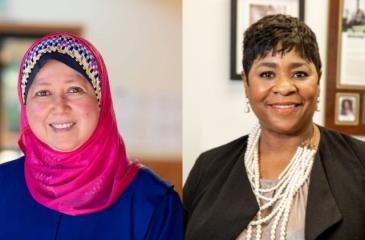
Jun 25, 2021
Pay Up: Now is the Time for Bold Investment in Environmental Justice Groups
At this moment when climate and environmental justice are being centered and marked for remedy, it is vital that the female founders and vanguards who have long centered their work around environmental justice principles be heard. As the Biden-Harris Administration begins to act on its climate, infrastructure and jobs policies and goals, it is imperative that people of color who have been most impacted by the burden and legacies of climate injustice are the first to receive its benefits, and that environmental justice groups who have already been on the ground doing this work are empowered, affirmed and receive fiscal investment to continue their efforts. We are two women of color and environmental justice leaders in the Midwest: Huda Alkaff, an ecologist, environmental educator, environmental justice activist, and the founder and director of Wisconsin Green Muslims who for more than two decades has advocated for environmental justice and initiated Muslim and interfaith programs on energy democracy, and water equity, and Donele Wilkins, an environmental justice activist, founder and CEO of the Green Door Initiative in Detroit; she has provided workforce development in the environmental and green collar sectors for people of color for nearly two decades, ensuring that more than 400 people secure good paying employment. Read more ...
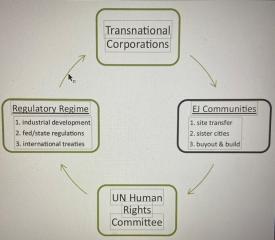
Jun 25, 2021
A Question of Human Rights: Transnational Targeting of Environmental Justice Communities
Beverly Wright, Earthea Nance, Denae King, and Joy Semien Abstract The paper describes, in historical and international perspective, the ongoing struggles of several communities in Louisiana and South Africa whose environment and public health have been damaged by the operations of the same transnational corporations. Previous research has tended to assess environmental injustice one community at a time. Missing from past research is an international perspective which exposes the ties between communities that host the same transnational corporations. For each of our case study communities, we illustrate the national and international policy gaps that have allowed powerful companies to systematically target vulnerable communities for profit. Because of the international dimensions of this problem, resolving it by local or national action alone is impractical. We argue that one of our case study communities represented a turning point in the international movement for environmental justice. The community of Mossville, Louisiana formally asked the United Nations for relief from years of environmental assault on the basis that their human rights had been violated. The paper shows how the decision of the Inter-American Commission on Human Rights, which recognized the human rights of Mossville residents, came closer than ever before to realizing environmental human rights for people around the world. Read more ...
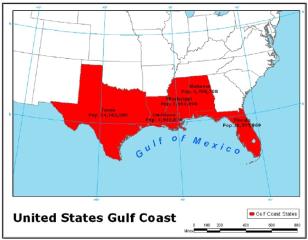
Jun 24, 2021
Perspectives on the Future of Climate and Environmental Justice on the US Gulf Coast
Webinar hosted by The National Academies of Sciences, Engineering and Medicine Marginalized communities along the Gulf coast are burdened by chronic stressors such as systemic or institutional racism, poverty, environmental degradation, and health disparities. Climate change threatens to exacerbate the severity of these impacts as disadvantaged and underserved communities fall further behind in their ability to prepare for, respond to, or recover from disasters. The Gulf Research Program invites you to Perspectives on the Future of Climate and Environmental Justice on the U.S. Gulf Coast on June 24, 2021 from 10-11am ET. Members of the White House Environmental Justice Advisory Council will discuss critical steps that are being taken or that need to occur to advance climate and environmental justice for all those who call the Gulf of Mexico region home. The conversation will feature Dr. Robert D. Bullard, Dr. Beverly L. Wright and Ms. Catherine Coleman Flowers and will be moderated by New Orleans Times-Picayune/ New Orleans Advocate journalist, Halle Parker. Read more Register for the webinar ...
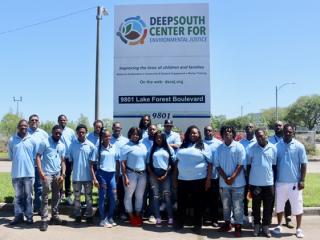
May 27, 2021
Congratulations to the ECWTP Class of 2021!
We are very proud of and happy for this year's Environmental Career Worker Training Program (ECWTP) Graduating class. This is our 26th annual class, and one of our finest in recent memory. The difficult and shifting conditions the COVID19 Pandemic did not weaken their determination and focus. Our New-Orleans based program took place from January 11th through April 14th (Graduation Day). Twenty (20) highly motivated male and female trainees participated this year learning through a virtual six week basic skills curriculum using a work-based model. The ECWTP also features six weeks of technical skills training which blends hands-on / interactive learning and classroom instruction. Graduates earned certificates in forty (40) hours hazardous waste operations, thirty-two (32) hour Asbestos Abatement, sixteen (16) hours Mold Remediation, sixteen (16) hours Lead Abatement, ten (10) hours OSHA General Industry, forty (40) hours General Construction, and forty hours (40) hours Weatherization Installer. The DSCEJ was able to hold an in-person Graduation Ceremony for our trainees at City Park. This event allowed our instructors, counselors, program staff and administrators to recognize their hard work and achievements - from Best Student to Most Improved Student in each course. This year, Kenisha Daggs was chosen "Best All-Around Student." The "Deborah Bates Survivor Award" went to Damian Crockem Sr. and Tia Kelly (Tribute to Deborah Bates Robinson). Our students found job opportunities waiting for them. As they fill these positions, we are confident that the good name and reputation the DSCEJ has earned will be reflected in them. Join us in wishing our ECWTP 2021 graduates all the best in life and their new careers. ...

May 25, 2021
Expanding the Communities' Capacity to Heal Itself Training
May 25th from 6:00 - 7:30 pm CST This training is both a declarative and procedural learning experience, designed to provide vulnerable communities with the tools necessary to create culturally, responsive trauma-informed systems. The training module seeks to provide participants with the following Increased understanding of a public health pandemic (Coronavirus) and a racial pandemic as a mental health disaster Increased understanding of the impact of COVID19 on emotional well being Increased understanding of trauma-informed systems Increased understanding of ways to integrate trauma-informed practices across the systems with which community members interface Increased understanding of activism and advocacy as a source of healing for vulnerable communities Trauma-Informed Approaches in Youth-Serving Organizations is a web-based, trauma-informed practice workshop that is part of our larger Professional Development Series. The Series prepares youth development professionals and educators to be equity-focused, trauma-informed, healing justice practitioners. The session on trauma-informed practice covers Adverse Childhood Experiences and its impact on brain development in early childhood. We also address vicarious trauma and the importance of self- care for helping professionals. The session also covers the basic principles of trauma informed systems and the key assumptions of trauma informed practice, as well as strategies for implementing trauma-informed practices in our work. Some of the strategies we cover in the training include social emotional learning activities along with identifying the ways in which writing, the arts, meditation and other practices can be implemented as healing modalities to support the well-being of young people and those who work with them. Register here Presenters: Dr. Rashida Govan Executive Director, New Orleans Youth Alliance Dr. Danielle Wright Division Director, Navigate NOLA ...
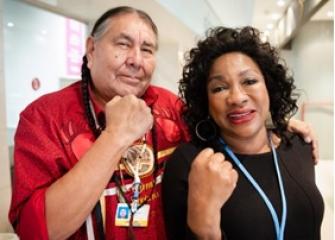
May 21, 2021
Groups to Governor Edwards: The Power Is in Our Hands to Stop Projects that Harm Communities and Warm Our Planet
Today, the Deep South Center for Environmental Justice and groups around the state called on Governor Edwards to set a moratorium on permitting oil, gas, and other industries that release toxic pollution and greenhouse gases in Louisiana. Our letter recognizes that this call has gone unanswered for decades as Black and Indigenous communities in Louisiana have been harmed and displaced by these industries. This week the International Energy Agency joined the call with a warning to governments and investors to stop new fossil fuel projects in order to avoid the worst of climate change. The time is now for us to center equity in the transition to renewable energy and electrification. “There can be no climate action without environmental justice. Whether it’s shutting down the Dakota Access Pipeline or making communities greener and healthier, our work with advocates around the world shows that the power for change is in our hands. As a leader in both climate and toxic pollution, there is much we have to do in Louisiana for the people and our future,” said Dr. Beverly Wright, DSCEJ Executive Director. Read the letter by DSCEJ and groups to Governor Edwards ...

May 21, 2021
New Orleans Gains Ground on Renewable Energy
New Orleans is now on the map as a city that requires renewable energy. The Renewable and Clean Portfolio Standard, passed by the New Orleans City Council, mandates that all electricity Entergy supplies to New Orleans comes from renewable and carbon-free energy by 2040, with maximum allowance of 10 percent offsets. The law also requires Entergy to eliminate oil, gas and coal from electricity supplied to our city by 2050. Unfortunately, the law allows Entergy to continue supplying nuclear energy, which is not “renewable” or “clean,” and disproportionately harms Black and Indigenous communities. The progress achieved by the Renewable and Clean Portfolio Standard moves our city forward on avoiding power plant pollution, cutting electric bills, and growing local jobs in renewable energy and energy efficiency. This is the result of a more than two-year campaign by the Deep South Center for Environmental Justice and partners in Energy Future New Orleans – Alliance for Affordable Energy, Greater New Orleans Housing Alliance, 350 New Orleans, Audubon Louisiana, PosiGen, Sunrise Movement New Orleans, Sierra Club, Union of Concerned Scientists, Vote Solar, and sheroes Ms. Dawn Hebert and Ms. Katherine Prevost. We thank residents across the city who participated in educational symposia, attended town hall meetings, signed petitions, joined virtual Energy & You conversations on Zoom, and made their voices heard this week at the meetings of the City Council and the Council Utility Committee. We appreciate the City Council for taking this step with us. ...
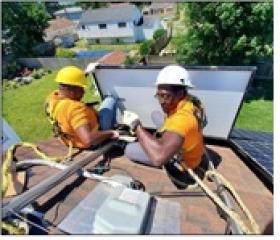
May 19, 2021
How We Can Make Electricity Cost Less and Do More in New Orleans
We will soon have the opportunity to set a new direction for renewable energy in New Orleans that lowers electric bills, creates jobs, and avoids the pollution that harms our neighborhoods and warms our planet. On May, 19, 2021 at 10:00 am, City Councilmembers on the utility committee will hold a public meeting to hear residents’ input on the draft Renewable Portfolio Standard or RPS. Read more on the Council’s draft RPS – the good, the bad, and the ugly – and what you can do to have your voice heard. Fill out the Public Comment Form and submit it between Tuesday, May 18th and before 10:00 am on Wednesday May 19, 2021. ...

May 4, 2021
Program Manager for (WTP) Position
PROGRAM MANAGER POSITION Worker Training Program (WTP) Position Description – Program Manager The Deep South Center for Environmental Justice is seeking an experienced Program Manager. We are interested in hiring a highly motivated person who can perform day-to-day administrative duties including tracking data, writing reports, attending WTP meetings and trainings, tracking WTP graduates' progress, and processing contracts and invoices. About the Organization The Deep South Center for Environmental Justice (DSCEJ) is a nonprofit organization dedicated to improving the lives of children and families harmed by pollution and vulnerable to climate change in the Gulf Coast Region through research, education, community and student engagement for policy change, as well as health and safety training for environmental careers. Currently, the DSCEJ employs 13 people. The DSCEJ directs projects involving universities and community-based organizations in seven states. The DSCEJ was founded by Dr. Beverly Wright in 1992 in collaboration with community environmental groups and universities in the Southern region to advance environmental justice. Since this time, the DSCEJ has become a powerful resource for environmental justice research, education, advocacy, as well as health and safety training for environmental careers. The DSCEJ provides opportunities for communities, scientific researchers, and decision makers to collaborate on projects that promote the rights of all people to be free from environmental harm as it impacts health, jobs, housing, education, and quality of life. A major goal of the Center continues to be the development of environmental justice leaders in African American and other communities of color along the Mississippi River Chemical Corridor and the broader Gulf Coast Region. Position Responsibilities · Incumbent must be experienced in and demonstrate strong oral and written communication skills. The position requires significant report writing, data collection, and communicating with community partners and employment agencies. · Incumbent will report to the Assistant Director for Training and Operations implementing day to day administration and program activities including tracking data, writing reports, attending WTP meetings and trainings, tracking WTP graduates' progress, and processing contracts and invoices. · Requires in-depth knowledge of WTP regulations and laws as well as knowledge of effective case management procedures. The ability to analyze data, problem solve and understand complex situations. The ability to communicate orally and in writing. The ability to establish and maintain effective working relationships with employment agencies and other partner agencies. Perform other duties as assigned. Required Skills and Qualifications · Bachelor’s degree in counseling, social work or related field. · Minimum of five years of experience. · Excellent time management skills and ability to meet deadlines. · High work ethic and integrity. · Proficiency in Microsoft Word and Excel programs, and Google platform. · A flexible, creative, entrepreneurial spirit and a shared for the mission, vision and values of the DSCEJ. · An approachable nature and ability to handle questions and requests timely. · Exceptional written and oral communication skills. · Ability to work independently and complete tasks. · Ability to contribute and collaborate with the team and across the organization. · Strong analytical and organizational skills. · Experience working with diverse constituents, teams and colleagues. · Ability to employ flexibility and creativity in the face of ambiguity and challenge. · Organizational and program management experience. Salary & Benefits Competitive salary and benefits package commensurate with qualifications and experience. Salary range: $55-65K. It is the policy of the Deep South Center for Environmental Justice to provide equal employment opportunities without regard to race, color, religion, sex, national origin, age, disability, marital status, veteran status, sexual orientation, gender identity, genetic information or any other protected characteristic under applicable law. HOW TO APPLY: Please email a detailed cover letter highlighting your interest, your resume and three professional references in Microsoft Word to maryw@dscej.org. Please include the Program Manager Position in the subject line. t ...
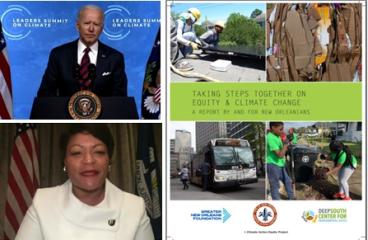
Apr 21, 2021
Say yes to climate action that achieves equity
On Earth Day, President Biden kicked off a two-day Leaders Summit on Climate in which New Orleans Mayor, LaToya Cantrell presented the work taking place in the Climate Action Equity Project, a partnership of the Deep South Center for Environmental Justice, City of New Orleans, and the Greater New Orleans Foundation. Our project brings together community-based organizations to recommend and implement climate action that tackles entrenched inequities in our city. Click here to view the roundtable discussion"Climate Action at All Levels," in which Mayor Cantrell highlights the Climate Action Equity Project. Check out our report, Taking Steps Together on Equity & Climate Change: A Report by and for New Orleanians ...